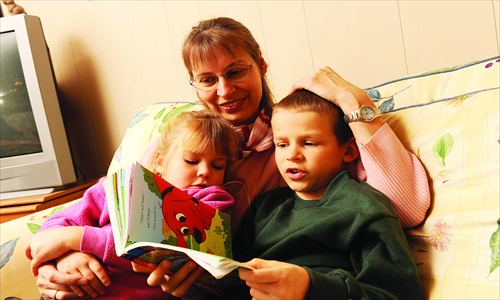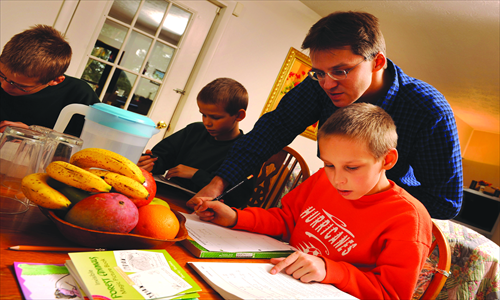No school – all homework


When Ty Ahdieh gets up in the morning at 8:30, he doesn't have to change out of his pajamas.
The 7-year-old brushes his teeth, eats breakfast, and then sits on a chair in the living room with his mom, Theresa, to begin lessons in math and reading.
Since Spring Festival this year, Theresa has been homeschooling Ty, mainly because the tuition to attend international schools in Beijing is too high.
"There was not really any affordable alternative for education in Beijing," she said. "We looked at the options — the starting tuition was 110,000 yuan ($18,000) for international schools."
Having already homeschooled an older daughter, Monique, Theresa has the confidence to teach another child at home. Theresa is one among many homeschooling parents in Beijing who are choosing this alternative educational style for their children in Beijing.
Some fear that homeschooled children will fall behind in their studies or miss out on friendships and learning how to get along with other people. But parents who tried it in Beijing say as long as you have a goal in mind from the beginning, the results can be the same or even better than traditional schools.
Family matters
When the time came to attend elementary school, Julie Johnson had a talk with her daughter, Kaylen Hou, about her wishes.
"She didn't want to go to kindergarten," Julie said. "We asked her … but all she wanted was a backpack - a schoolbag, but she didn't really want to go and be away from family."
Kaylen asked many questions Julie didn't know how to answer, such as: "What if I want to go the bathroom," or "What if I just want to see your face," Julie said. It broke Julie's heart to answer these questions, so she and her husband decided to teach Kaylen at home.
Amanda Powell Castillo pulled her child from regular schools out of health concerns. Amanda has been in Beijing since 1989, and when her twin daughters, Ines and Mercedes, were sent to school at age three and half, they got sick all the time.
"I thought to myself, let's have a break," Amanda said. "I read about homeschooling, I thought maybe I would try to do this. I had no experience at all; it was kind of fun, so we continued."
Ines and Mercedes, now 18, have been educated completely at home. They are currently in their last year of homeschool study and are preparing to take the A-level exams to apply for college in the UK.
Amanda confessed she had no idea how homeschooling would play out at first, especially since hardly anyone was doing it at the time she started.
"I had worries at first, absolutely," she said. "I'm not a trained teacher. I went to university and got a degree but didn't study teaching. It's a bit scary."
Fear of math
One concern many parents have is how to design a curriculum for the children. Parents may find themselves lost at first, not knowing what kind of curriculum to follow, especially when the parents are not wellversed in certain subjects.
"At first it wasn't difficult," Amanda said. "But I was worried about what I would do when [my kids] got older."
Right around the time her twin girls turned 13, Amanda found an Internet-based school that uses the same system and curriculum as the schools in the United Kingdom, where she is from.
"You just have to log on everyday, and there are teachers to talk to you. You have a whole class, books and exams," she said. From the ages of 13 to 16, her twin girls followed the system, which was a relief for Amanda since she was "not comfortable with things like algebra and was never good at math at school."
Julie also said there are lots of lesson plans available online. She used a site named Homeschooling Curriculum Review for homeschooling children in the United States. It is designed to support standardized assessments.
Like Julie, Theresa went online for help to design her curriculum for Ty. She bought a package from K12 iCademy, an online program. That worked out fine, but Theresa says one thing homeschooling lacks is the peer pressure at regular schools that push the child to finish all the work.
"With my daughter, we finished her seventh grade year with all literature, math and history classes, but didn't finish all her classes in music and art," she said. This is because Monique wasn't in school so they procrastinated a little on the schedule, and had to focus on the main subjects in the end. So for Ty, Theresa changed her tactics a bit.
A regular school day for Ty starts in the morning between 8 and 8:30, when he sits with Theresa at the living room table. There's a calendar on the wall made of Post-It notes, and Theresa looks on the sheet to see what needs to be done that day.
"For a first grader, there should be no more than three to four hours of actual studying a day … and we usually are done before lunchtime," she said. This way, the afternoon can be used to pursue other activities, such as sports, Theresa said, calling this an advantage with homeschooling.


Social studies
Unlike kids who attend schools, homeschooling parents have to create opportunities for the kids to socialize.
Deborah Lukic, who moved to Beijing in 2005 with her daughter Adishakti, now 12, and son Div, now 10, has been homeschooling the children for eight years in Beijing. It was easy for her children, because they had each other to hang out with in the afternoon, when their work is finished.
"We would do three or four hours of work in the morning, and use the afternoon to do something else," she said. "They always had each other, that's a big support."
Other parents' children often socialize with kids from the compound they live in or sports clubs.
Amanda signed her children up with an organization called Sports Beijing. Her son Alex does karate with the organization, and sometimes soccer.
Finding playmates is easy. "We live in a compound that's full of children. Go to the playground and they are all there," she said.
Deborah also dispels the myth that homeschooled children may not socialize as well as other children do, saying her children, who have now gone back to school, are making fast friends.
"I think they talk to and hang out with people of all ages, because they aren't just sitting in the classroom with people their own age," she said.
Transcripts please
One of the downfalls of homeschooling is lack of official proof that you've done it, Theresa said.
"After homeschooling, when they enter international school, they need to show a transcript and things like that. That's a challenge. [Ideally you can use a] portfolio to show that they've come up to a certain level," she said.
Theresa's portfolio has a sample of the children's best writing, art work and small samples of math and social studies work they've done over the years, to show the international schools.
For Julie, the key is to know what you are trying to achieve.
"If you want to transition back to the school systems, you have to be ready to transition back - by doing all the subjects, for example," she said.
If the parents think homeschooling their children to prepare for university is the goal, then step by step, the parents should guide the kids there, Julie said. Amanda used that approach with her children. Even though they've been homeschooled for about 15 years, they are taking the national standardized exam in UK in order to go to college.
Julie's moment of pride came when her daughter entered the regular school system and became the top of her class.
"The teachers loved her, she got every award that could be given and had friends - didn't have any social issues," she said. "I'm not bragging about her, I just want to show that homeschooling works."